- Getting Started
- Setup and Configuration
- Automation Projects
- Dependencies
- Types of Workflows
- Control Flow
- File Comparison
- Automation Best Practices
- Source Control Integration
- Debugging
- Logging
- The Diagnostic Tool
- Workflow Analyzer
- About Workflow Analyzer
- ST-NMG-001 - Variables Naming Convention
- ST-NMG-002 - Arguments Naming Convention
- ST-NMG-004 - Display Name Duplication
- ST-NMG-005 - Variable Overrides Variable
- ST-NMG-006 - Variable Overrides Argument
- ST-NMG-008 - Variable Length Exceeded
- ST-NMG-009 - Prefix Datatable Variables
- ST-NMG-011 - Prefix Datatable Arguments
- ST-NMG-012 - Argument Default Values
- ST-NMG-016 - Argument Length Exceeded
- ST-NMG-017 - Class name matches default namespace
- ST-DBP-002 - High Arguments Count
- ST-DBP-003 - Empty Catch Block
- ST-DBP-007 - Multiple Flowchart Layers
- ST-DPB-010 - Multiple instances of [Workflow] or [Test Case]
- ST-DBP-020 - Undefined Output Properties
- ST-DBP-021 - Hardcoded Timeout
- ST-DBP-023 - Empty Workflow
- ST-DBP-024 - Persistence Activity Check
- ST-DBP-025 - Variables Serialization Prerequisite
- ST-DBP-027 - Persistence Best Practice
- ST-DBP-028 - Arguments Serialization Prerequisite
- ST-USG-005 - Hardcoded Activity Properties
- ST-USG-009 - Unused Variables
- ST-USG-010 - Unused Dependencies
- ST-USG-014 - Package Restrictions
- ST-USG-017 - Invalid parameter modifier
- ST-USG-020 - Minimum Log Messages
- ST-USG-024 - Unused Saved for Later
- ST-USG-025 - Saved Value Misuse
- ST-USG-026 - Activity Restrictions
- ST-USG-027 - Required Packages
- ST-USG-028 - Restrict Invoke File Templates
- ST-USG-032 - Required Tags
- ST-USG-034 - Automation Hub URL
- Variables
- Arguments
- Imported Namespaces
- Coded automations
- Introduction
- Registering custom services
- Before and After contexts
- Generating code
- Generating coded test case from manual test cases
- Troubleshooting
- Trigger-based Attended Automation
- Object Repository
- The ScreenScrapeJavaSupport Tool
- Extensions
- About extensions
- SetupExtensions tool
- UiPathRemoteRuntime.exe is not running in the remote session
- UiPath Remote Runtime blocks Citrix session from being closed
- UiPath Remote Runtime causes memory leak
- UiPath.UIAutomation.Activities package and UiPath Remote Runtime versions mismatch
- The required UiPath extension is not installed on the remote machine
- Screen resolution settings
- Group Policies
- Cannot communicate with the browser
- Chrome extension is removed automatically
- The extension may have been corrupted
- Check if the extension for Chrome is installed and enabled
- Check if ChromeNativeMessaging.exe is running
- Check if ComSpec variable is defined correctly
- Enable access to file URLs and Incognito mode
- Multiple browser profiles
- Group Policy conflict
- Known issues specific to MV3 extensions
- List of extensions for Chrome
- Chrome Extension on Mac
- Group Policies
- Cannot communicate with the browser
- Edge extension is removed automatically
- The extension may have been corrupted
- Check if the Extension for Microsoft Edge is installed and enabled
- Check if ChromeNativeMessaging.exe is running
- Check if ComSpec variable is defined correctly
- Enable access to file URLs and InPrivate mode
- Multiple browser profiles
- Group Policy conflict
- Known issues specific to MV3 extensions
- List of extensions for Edge
- Extension for Safari
- Extension for VMware Horizon
- Extension for Amazon WorkSpaces
- SAP Solution Manager plugin
- Excel Add-in
- Studio testing
- Troubleshooting
- About troubleshooting
- Assembly compilation errors
- Microsoft App-V support and limitations
- Internet Explorer X64 troubleshooting
- Microsoft Office issues
- Identifying UI elements in PDF with Accessibility options
- Repairing Active Accessibility support
- Validation of large Windows-legacy projects takes longer than expected

Studio user guide
Extension for Safari
Starting with UiPath.UIAutomation.Activities version 24.10.0, Safari UI Automation support is available in preview. The extension for Safari allows you to:
- Design UI automations in Studio Web within the Safari browser on macOS.
- Execute browser automations in Safari using a local macOS Robot, previously installed and connected to the Orchestrator.
- Start attended browser automations in Safari via the macOS Assistant.
To create and run such automations, you must install the UiPath Browser Automation extension for Safari.
You can start from Studio Web by adding any UI Automation activities. When accessing Studio Web from Safari, you are prompted to install the UiPath extension for Safari from the App Store. Follow the setup guide to configure the extension, then start designing your workflows for browser automation in Safari.
To create browser automations in Safari on machines running macOS, the minimum supported version is macOS 12.
Install
Install from UiPath Studio Web
-
In UiPath Automation Cloud™, access Studio Web.
-
Add a Use Browser activity to your project. You are prompted to install the UiPath extension for Safari.
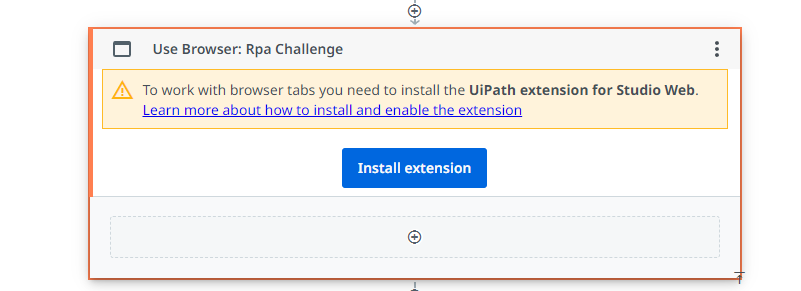
-
Select the Install extension button.
-
You are directed to the App Store, to install the UiPath Browser Automation extension.
-
Select Get to install the extension, and then Open it.

-
After selecting Open, you are directed to a configuration window.
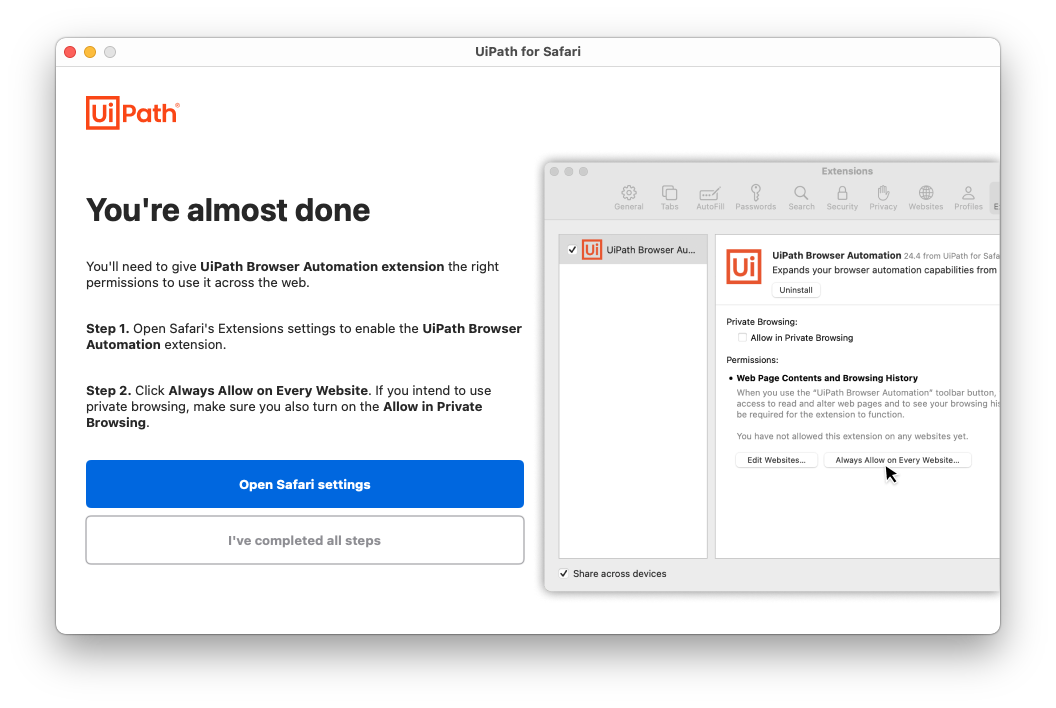
-
Select Open Safari settings to access the Extensions window, where you can set the right permissions for the newly installed extension.
- Enable the UiPath Browser Automation extension in the left-side panel.
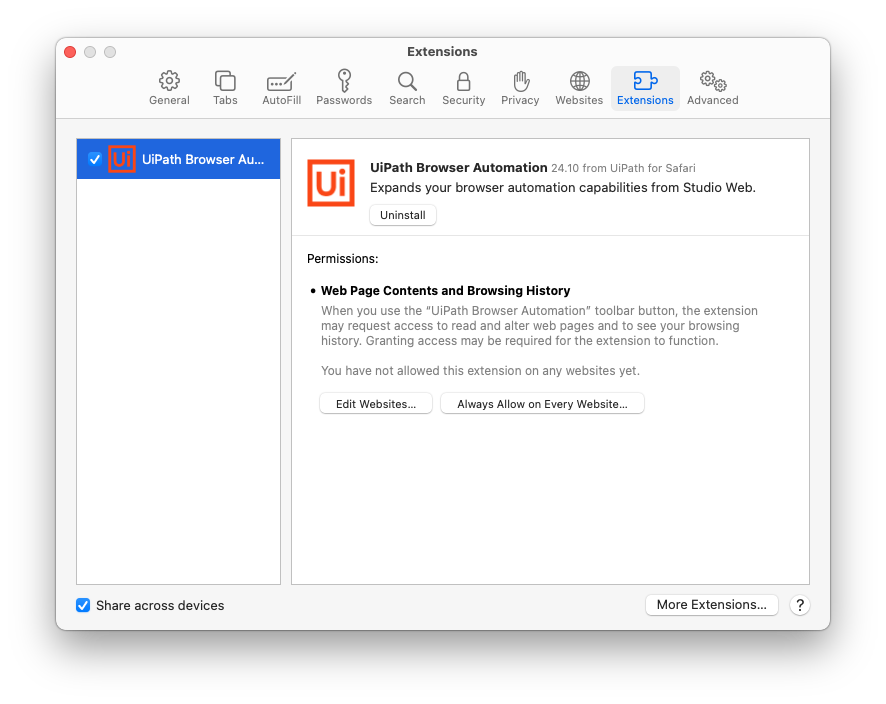 2. Select Always Allow on Every Website and confirm this choice.
2. Select Always Allow on Every Website and confirm this choice.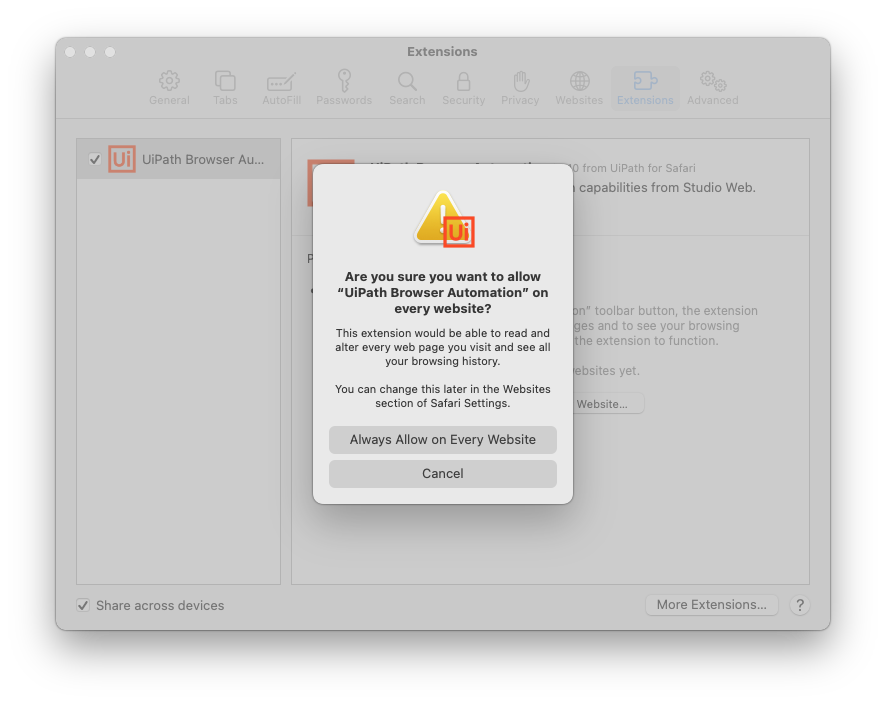 3. If you intend to use private browsing, enable the Allow Private Browsing setting.
3. If you intend to use private browsing, enable the Allow Private Browsing setting. -
Once you complete these steps, a message informs you that the extension is now available.
Install from App Store
You can access the UiPath extension for Safari directly in the App Store and continue the installation process from step 4 of the previous section.
Install from UiPath Assistant
Installing the Safari extension from Studio Web or directly from the App Store also installs the Native Host component. This means that you can run automations from UiPath Assistant without the need for additional installation.
You can install the UiPath Extension for Safari from UiPath Assistant, from the UiPath Extensions page, through an Install button which redirects you to the App Store.

Uninstall
Uninstall from Safari settings
-
Access Safari Settings.
-
Navigate to the Extensions tab.
-
Select the Uninstall button.
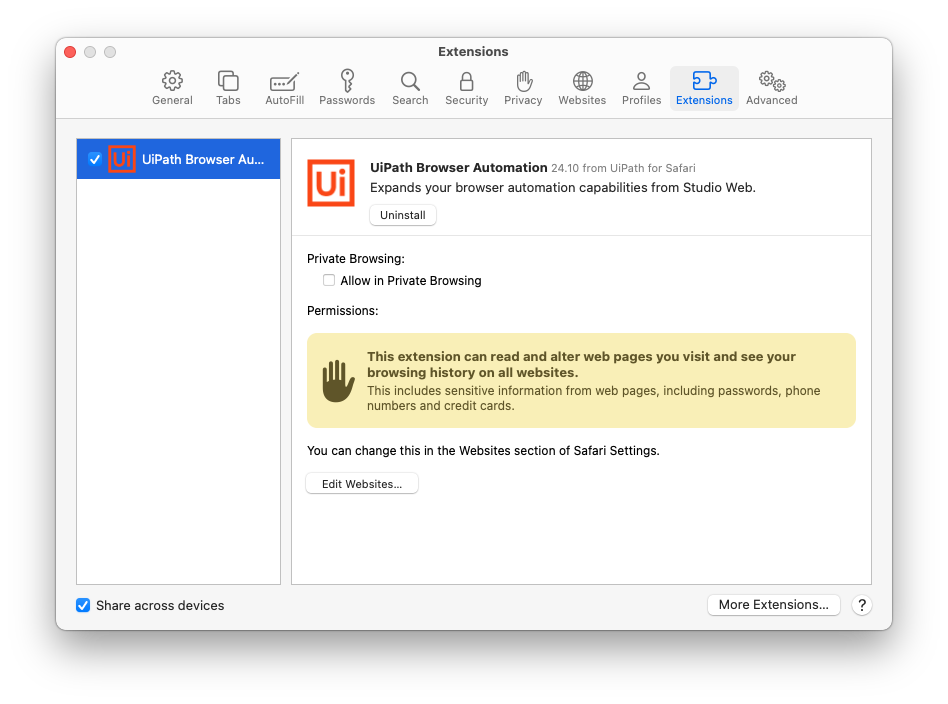
-
Select the Show in Finder button. This opens the Finder with the application selected.
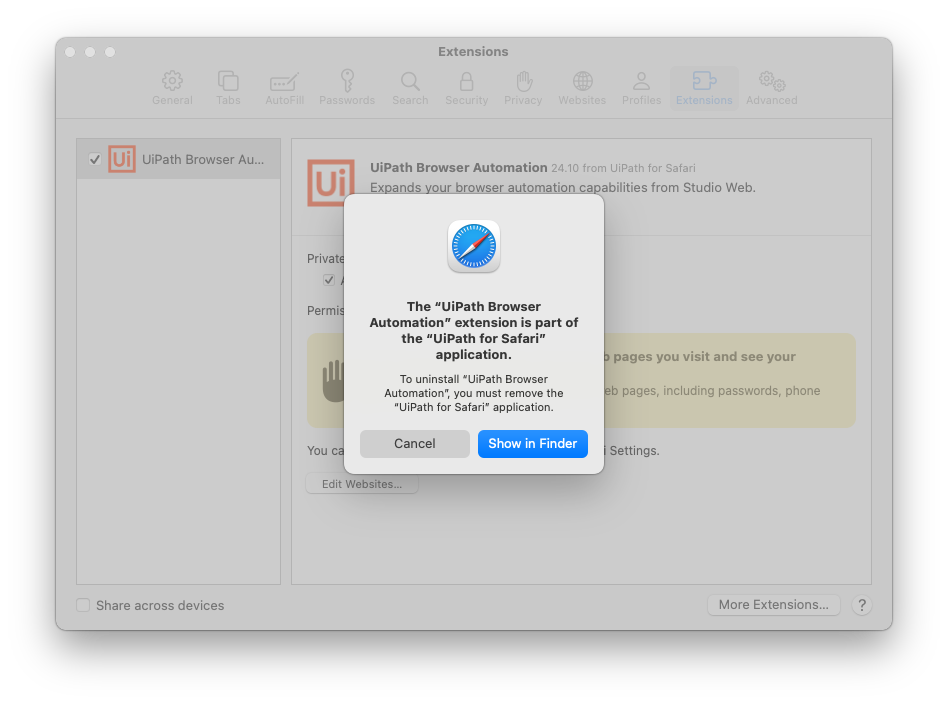
-
Right-click the UiPath for Safari application and select the Move to the Bin button.

If you see a pop-up message stating that the application could not be deleted because it is currently in use, you have to make sure the extension application is closed.
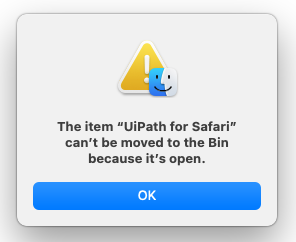
To do this, open Activity Monitor and search for UiPath Native Host for Safari. Select the application, and choose Stop. In the next step, select Quit.

Now, you can go back to Finder, and select again Move to Bin.
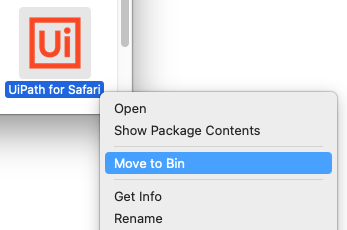 6. Enter your Mac credentials and then select the OK button to authorize this deletion.
6. Enter your Mac credentials and then select the OK button to authorize this deletion.
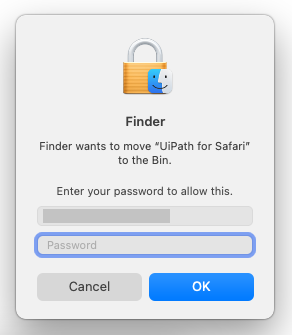 7. The extension is now uninstalled. Once the extension is deleted, it is removed from the Safari extension bar and from Safari Settings Extensions tab.
7. The extension is now uninstalled. Once the extension is deleted, it is removed from the Safari extension bar and from Safari Settings Extensions tab.
Accessibility configuration
To use the Hardware Events input mode, you must specifically grant UiPath Assistant access to your Mac using the Privacy & Security settings.
To do so, follow the steps below:
-
Select the Apple menu.
-
Select System Settings.
-
Select Privacy & Security in the left sidebar.
-
Go to Accessibility by selecting the arrow on the right-hand side.
-
Enable UiPath Assistant application from the list. If you do not see the application, click the plus button at the bottom of the list, search for UiPath Assistant, select the application, and choose Open. Mac credentials are requested for this change.
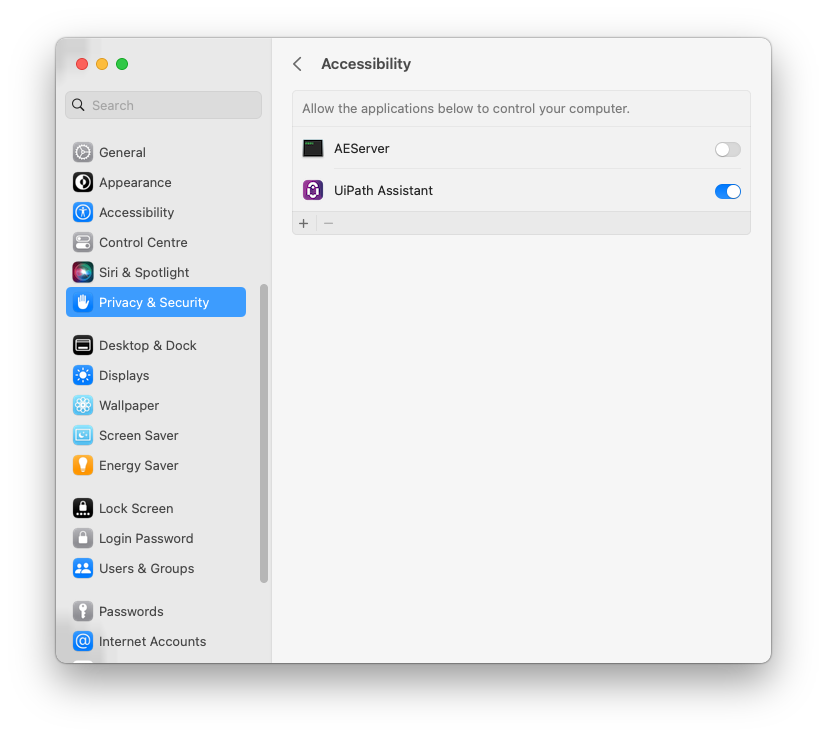
Known limitations
Consider the following limitations when creating browser automations for Safari:
- The extension cannot access file URLs. This is a Safari limitation, as explained in this Apple Developer forum thread (Allow access to file URLs for web extensions).
- The extension does not support multiple profiles.